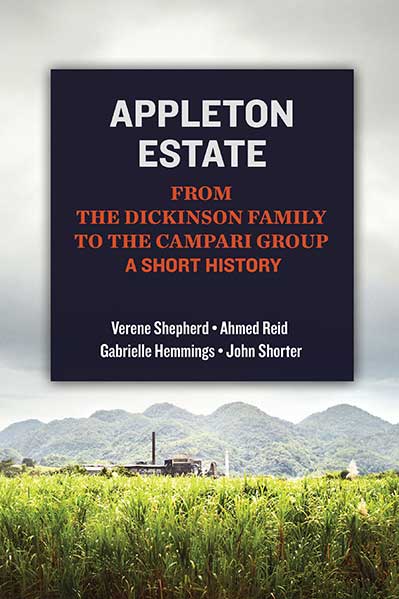The book is a mere snippet of the vast history of the home of Jamaica’s famous rum brand that is said to have had its origins dating back to the English conquest of Jamaica in 1655, but, hopefully, fulfills the desire of the owners to have a more accurate account of Appleton Estate’s history, using the lens of the past to understand their present.

Appleton Estate – From the Dickinson Family to the Campari Group: A Short History
By: Verene Shepherd, Ahmed Reid, Gabrielle Hemmings, John Shorter
Available in e - book only
Price: $9.99

This brief history of Appleton Estate traces the ownership pattern of the property, from the land grant to Francis Dickinson, through William Hill, Alexander McDowell Nathan, Cecil Lindo and his brothers and heirs, down to J. Wray & Nephew Ltd and its present-day owners, the Campari Group of Italy. The book is a mere snippet of the vast history of the home of Jamaica’s famous rum brand that is said to have had its origins dating back to the English conquest of Jamaica in 1655, but, hopefully, fulfills the desire of the owners to have a more accurate account of Appleton Estate’s history, using the lens of the past to understand their present.
The publication is the outcome of a Research Project commissioned by J. Wray & Nephew Limited and carried out by a team from the Centre for Reparations Research (CRR) of The University of the West Indies. Its findings show how Appleton Estate’s history tracks closely with that of Jamaica’s, following the condensed trajectory of indigenous people’s settlement, European conquest and colonisation, chattel enslavement of Africans, emancipation, Asian indentureship, and concluding with the modern corporate enterprise.
The authors have used the findings of their research to pay respect to the enslaved men and women whose unpaid labour not only enriched the Dickinson family but laid the foundation for the development, financial success, and later fame of the iconic rum brand and its owners.
List of Figures
List of Tables
Preface and Acknowledgements
Researching, Writing, and Righting the Story of Appleton Estate
Appleton Estate Under the Dickinsons: Fate, Family, and Fortune
Profit and Power: Livestock, Sugar, Slavery
Abolition and Emancipation: Adjustments at Appleton Estate
Banking on Rum: The Making of a Modern Brand
The Joy Spence Appleton Rum Experience: The Twenty-first Century
Conclusion
Select Bibliography
Index
Verene Shepherd is a Social Historian and Director of the Centre for Reparation Research at The University of the West Indies. Among her other books are (with Gabrielle Hemmings) Introduction to Reparation for Secondary Schools (2021) and Livestock, Sugar & Slavery: Contested Terrain in Colonial Jamaica (2009).
Ahmed Reid is Associate Professor of Caribbean History at Bronx Community College of The City University of New York, a Network Scholar and former Visiting Professor in the Centre for Reparation Research at The University of the West Indies.
Gabrielle Hemmings is a graduate student researching “Poverty, Inequality and Development” at the University of Birmingham, United Kingdom, and former research assistant at the Centre for Reparation Research at The University of the West Indies. She is co-author (with Verene Shepherd) of Introduction to Reparation for Secondary Schools (2021).
John Shorter is a graduate student specialising in “Public History & Caribbean Heritage” in the Department of History & Archaeology at The University of the West Indies, Mona Campus. He is also a former research assistant at the Centre for Reparation Research at The University of the West Indies.

